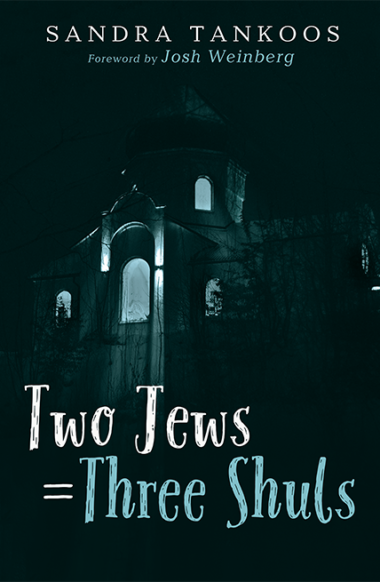2 Jews = 3 Shuls
A Murder Mystery
What readers say
Read the book for yourself
What you find in Sandy Tankoos’ first novel could be your synagogue or anyone’s synagogue. It is riveting from the first page to the last. So many issues that synagogue’s confront and don’t confront — they are all in the story! And a murder to be solved as well! A real page turner. A must reader for anyone and everyone who cares about religious life as it gets played out day to day.
The first word that came to mind when I finished this book is “smart.’ This is a very smart book. It understands the language and culture of Jewish Long Island. It understands the inner workings – with all of the warts – of suburban synagogue life. Sides are drawn, irrationality hides behind faith and petty jealousies abound. Smart. The reader cares about the search for the perpetrator of a dark deed. Mysticism meets love, and love unleashes memories of pain and of horrendous loss. The author’s voice is authentic – and smart. Highly recommended.
Reviews
|
Don’t take our word, see our testimonials.
By Jim Alkon – June 22nd, 2020
Being the rabbi for a highbrow, highly opinionated congregation can be murder. Literally.
Ask Rabbi Saul Levinson, religious leader and guiding light of Beth Torah Synagogue on the north shore of Long Island, NY. Ask him figuratively, that is. After all, he’s dead.
In Two Jews = Three Shuls (Resource Publications) Sandra Tankoos has given us an engaging, fast-paced whodunnit that captures readers from beginning to end. But through careful development of the lead characters and detailed descriptions of the supporting cast, the author — a former synagogue president — has provided a spot-on microcosm of a wealthy, prestigious Jewish community with all its intricacies, meddling and warts.
One almost forgets the venue is a religious institution — maybe more of a cultural institution. The personalities are so real as to be comical and frightening at the same time. And, of course, one is a murderer.
When he arrives at the Conservative Beth Torah, Rabbi Levinson is the beloved pillar of the community, a celebrity. “People came from near and far to listen to him speak out on important issues … and he did not disappoint them.” He could recite the phone book, his congregants said, “and everyone would listen.” Another King Solomon, they proudly proclaimed.
Yet as times change and more current societal perspectives gain followings and seek favor, Rabbi Levinson holds to his staunchest traditional beliefs and will not waver to a needy congregation in generational flux. Apparently, he had moved “so far to the right in his daily observance of ritual that he began to exasperate” some of the very congregants who worshipped him. In fact, the temple’s Young Couples Club threatens to start its own synagogue.
Rabbi Levinson has acquired enough enemies so that when he shows up dead in the synagogue library early on, there is no shortage of suspects.
One person seemingly not on that list is the book’s other protagonist, Deborah Katzman, an attorney who reluctantly accepts the position of president of the synagogue, making her the first female president, placing her squarely in working partnership with the rabbi, and then being the primary participant in finding his killer. Deborah is a Holocaust survivor, which comes with a ton of baggage that she can never completely shed but for which she seems to have overcome.
The cast of characters from there is a marvelous troupe: Esther, the rabbi’s wife; Deborah’s husband Carl; Sisterhood president Rochelle and her husband Harry; board member Simmy; temple president-in-waiting Barry; Leonard, the temple administrator; Detective Brody; and plenty of parents, grandparents and other players.
Tankoos masterfully keeps the investigation moving while interjecting colorful narratives about the characters, who are essential to the story but also provide such a lovely panorama of subplots, attitudes, culture, community, and, okay, religion.
And what about the book title?
Says Tankoos, “You’ve heard the joke where a Jewish man is stranded on an island. When he’s found, he shows his rescuers the two synagogues that he’s built. Why two? ‘This is the one I go to,’ he says, ‘and the other is the one I wouldn’t be caught dead in.’ Jews are always questioning, which is why there are always so many synagogues around, particularly in Orthodox communities. People start their own synagogue because they’re not happy with what’s happening in the one they’re in.” Shul, of course, being Yiddish for synagogue.
“We cry on the inside and smile on the outside,” says Deborah’s Aunt Rose. “That’s what it means to be Jewish. It’s a skill we have acquired over the centuries.”
Two Jews = Three Shuls is available for purchase; learn more about the book in our interview with the author here. And read more about Tankoos on her BookTrib author profile page.
